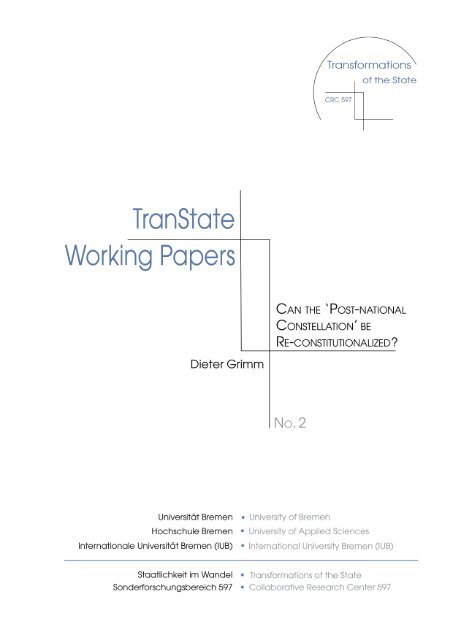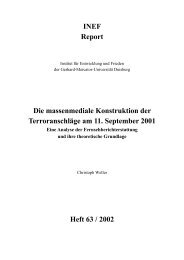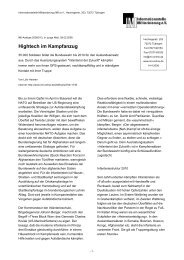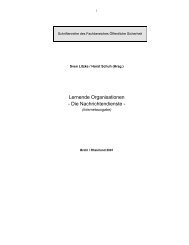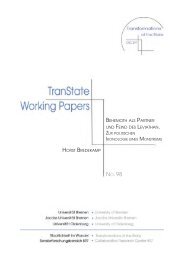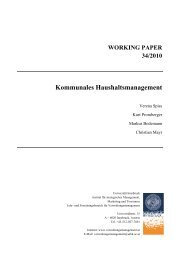Untitled - eDoc
Untitled - eDoc
Untitled - eDoc
Create successful ePaper yourself
Turn your PDF publications into a flip-book with our unique Google optimized e-Paper software.
Dieter Grimm<br />
Can the ‘Post-national Constellation’<br />
be Re-constitutionalized?<br />
TranState Working Papers<br />
No. 2<br />
Sfb597 „Staatlichkeit im Wandel“ − „Transformations of the State“<br />
Bremen, 2004<br />
[ISSN 1861-1176]
Sfb 597 „Staatlichkeit im Wandel“ - „Transformations of the State“ (WP 2)<br />
Dieter Grimm<br />
Can the ‘Post-national Constellation’ be Re-constitutionalized?<br />
(TranState Working Papers, 2)<br />
Bremen: Sfb 597 „Staatlichkeit im Wandel“, 2004<br />
ISSN 1861-1176<br />
Universität Bremen<br />
Sonderforschungsbereich 597 / Collaborative Research Center 597<br />
Staatlichkeit im Wandel / Transformations of the State<br />
Postfach 33 04 40<br />
D - 28334 Bremen<br />
Tel.:+ 49 421 218-8720<br />
Fax:+ 49 421 218-8721<br />
Homepage: http://www.state.uni-bremen.de
Sfb 597 „Staatlichkeit im Wandel“ - „Transformations of the State“ (WP 2)<br />
Can the ‘Post-national Constellation’ be Re-constitutionalized?<br />
ABSTRACT<br />
The constitutionalization of the state, the juridification of political power is one of the<br />
major achievements in the civilization of modern politics. Can and will this achievement<br />
survive the post-national constellation?<br />
The state no longer possesses all powers but some of its ruling authority has been<br />
transferred to non-state actors. Increasingly, regulations are the result of negotiations<br />
and agreements between state agencies and private parties. This, on the one hand, affects<br />
democratic legitimacy, since the parliaments are more and more sidelined. But<br />
these processes also undermine the rule of law. Such agreements evade the necessary<br />
formalization of law as they are rarely publicized. Nevertheless they are necessary to<br />
provide public goods. Globalization and internationalization further aggravate this problem.<br />
And the constitutionalization of international politics offers no ready-made solution<br />
for this problem: The WTO or even the EU both have to rely on the regular means<br />
of physical coercion still controlled by nation states. Even the EU is not a union of the<br />
people but of its member states, its democratic legitimacy is limited and, above all, its<br />
legalization and constitutionalization is rather circumscribed, and that can be attributed<br />
to the very same forces which also undermine democratic accountability at the state<br />
level.<br />
The aspiration expressed in the concept of constitutions and constitutionalization can,<br />
therefore, not even be approximately realized on the global level.
Sfb 597 „Staatlichkeit im Wandel“ - „Transformations of the State“ (WP 2)<br />
CONTENTS<br />
I. THE CLAIM OF THE CONSTITUTION...................................................................................1<br />
II. THE CONSEQUENCES OF DENATIONALIZATION................................................................8<br />
REFERENCES......................................................................................................................17<br />
BIOGRAPHICAL NOTE ........................................................................................................23
Sfb 597 „Staatlichkeit im Wandel“ - „Transformations of the State“ (WP 2)<br />
Can the ‘Post-national Constellation’ be Re-constitutionalized?<br />
∗<br />
I. THE CLAIM OF THE CONSTITUTION<br />
In 1973 Niklas Luhmann could still assert that a radical change in the state of the constitution<br />
and the institutional and operational understanding of constitutional arrangements<br />
comparable to the establishment of the constitutional state in the late eighteenth century<br />
has never occurred again (Luhmann 1973: 4). In the meantime, such a change is looming.<br />
Its cause is the process of the decline of statehood [Entstaatlichung], which could<br />
not then be foreseen. In essence, this consists of the transfer of public power to nonstate<br />
actors and its exercise in non-state procedures. This has consequences for the constitution<br />
because it originally referred to the state. Its historical significance lay in the<br />
juridification [Verrechtlichung] of public power, and public power was identical to state<br />
power. Owing to the advantages associated with this, the constitution was regarded as a<br />
civilizing achievement up to the present day (Luhmann 1990). Pre-state forms of political<br />
rule not only had no constitution, they could not have had one. The question is<br />
whether this achievement can survive in the “postnational constellation.” (Habermas<br />
2001).<br />
By constitution I understand here the law produced through a political decision that<br />
regulates the establishment and exercise of political rule. The constitution in this sense<br />
is a novelty of the eighteenth century that of course did not arise out of nothing, but had<br />
not previously existed in this form (Grimm 2002a; 1995b: 10ff.). The normative constitution<br />
came into being in 1776 on the periphery of what was then the western world, in<br />
North America. Thirteen years later, in 1789, it reached Europe. In Europe and the other<br />
parts of the world it influenced, the whole nineteenth century was permeated and determined<br />
by the struggle around the spread of the constitution. The victory the idea of constitutionalism<br />
seemed to win at the end of the First World War, however, turned out to<br />
be short-lived. Only toward the end of the twentieth century, after numerous detours and<br />
reversals, did constitutionalism prevail universally. Today, constitutionless states are the<br />
exception, which, of course, is not to say that the constitution is intended or taken seriously<br />
everywhere.<br />
∗<br />
This paper is an expanded and revised version of the inaugural lecture for the Collaborative Research Centre (Sfb)<br />
“Transformations of the State,” (TranState) presented on January 15, 2004 in Die Glocke in Bremen. For a German<br />
version see „Die Verfassung im Prozess der Entstaatlichung“, in: Michael Brenner, ed,, Der Staat des Grundgesetzes.<br />
Kontinuität und Wandel. Festschrift für Peter Badura zum siebzigste Geburtstag (Tübingen: Mohr-Siebeck)<br />
2004, pp. 145-167.<br />
- 1 -
Sfb 597 „Staatlichkeit im Wandel“ - „Transformations of the State“ (WP 2)<br />
Concerning its novelty, we should not let ourselves be deceived by the fact that the<br />
notion of ‘constitution’ is older than the US and French constitutions. Before their appearance<br />
it was not a normative concept but an empirical one (Mohnhaupt/Grimm<br />
2002). Brought into political language from the description of nature, it designated the<br />
condition of a country, as shaped by the character of its territory and inhabitants, its<br />
historical development and prevailing power relations, its legal norms and political institutions.<br />
With social philosophy’s increasing effort to restrict state power in favor of<br />
the freedom of subjects, the notion of “constitution” was narrowed; its non-normative<br />
elements were gradually cast off until the constitution finally appeared to be the condition<br />
determined by public law. It was nevertheless not the kernel of constitutional norms<br />
but rather the condition they determined that was designated by the word “constitution.”<br />
The late-eighteenth-century revolutions in North America and France violently overthrew<br />
ancestral rule and established a new order on the basis of rational planning and<br />
legal codification. Only then, did a transition from a descriptive to a prescriptive concept<br />
occur. Since then the constitution has ordinarily been identified with the complex<br />
of norms that fundamentally and comprehensively regulate the establishment and exercise<br />
of state power. The empirical constitution did not disappear, but returned in the<br />
shape of the “constitutional reality” that influences the law. But when we speak of constitutionalization,<br />
we always speak of the legal and not the factual constitution. The legal<br />
constitution does not reproduce social reality but addresses expectations to it, the<br />
fulfillment of which does not go without saying and for just this reason requires legal<br />
support. The constitution thus takes its distance from political reality and only thereby<br />
acquires the ability to serve as standard for political behavior and judgment.<br />
If the legal constitution did not arise earlier, this is because it depends on preconditions<br />
that did not exist in the past. For a long time the constitution in the sense of a law<br />
that specializes in norming political rule lacked an object. 1 Before the functional differentiation<br />
of society there was no social system that, by its delimitation from other systems,<br />
specialized in the exercise of political rule. Rather, the tasks of ruling were divided<br />
up by location, subject matter, and function among numerous independent bearers.<br />
There was no comprehensive political body to which the particular rights of rule<br />
could have been ascribed. Rights referred less to territories than to people. Their bearers<br />
exercised them not as independent functions but as an adjunct of a certain social status,<br />
namely, as landholders. What are now held apart as private and public were still mixed<br />
together.<br />
1<br />
See Helmut Quaritsch (1970: 182ff.); on the older order of domination, see Quaritsch (1970: 196ff.), as well as<br />
Otto Brunner (1970); on the significance of the transition to functional differentiation, see Niklas Luhmann (1997:<br />
595ff.; 2000: 69ff.).<br />
- 2 -
Sfb 597 „Staatlichkeit im Wandel“ - „Transformations of the State“ (WP 2)<br />
This is not to say that rule was exercised without any legal bounds. To the contrary,<br />
there was a dense mesh of legal bonds that were traced back to a divine foundation or<br />
held traditionally. For this reason they had priority over the enacted law and could not<br />
be altered by it. But these legal bonds did not represent a constitution in the sense of a<br />
particular law specializing in the exercise of political rule. Just as the authority to rule<br />
was only a dependent adjunct of other legal positions, it was governed by the corresponding<br />
law. From this we see that not every juridification of authority results in a<br />
constitution. The many works devoted to the ancient or medieval constitution do not<br />
thereby lose their value. But one must not confuse these constitutions with the normative<br />
text, implemented on the basis of a political decision that claims to regulate rule.<br />
From the perspective that interests us here, the decline of statehood, however, it is<br />
more significant that only with the modern state does an object emerge capable of having<br />
a constitution. Like the normative constitution, the state too was a historical novelty,<br />
but temporally it preceded the constitution. State-building arose when religious divisions<br />
removed the basis for the medieval order based on divine revelation and a new<br />
form of political domination developed in continental Europe in reaction to the confessional<br />
civil wars of the sixteenth and seventeenth centuries (cf. Schnur 1962; Tilly<br />
1975; Anderson 1979; Dyson 1980). It was based on the conviction, prepared by Bodin<br />
and other French theorists, that only a superior power can settle civil wars. This superior<br />
power raises itself above the warring parties and possesses sufficient power resources to<br />
establish and enforce a new order independent of contested religious truths, and thus to<br />
reestablish domestic peace.<br />
In this effort, the princes of various territories, starting with France, undertook to<br />
unite the numerous, scattered prerogatives and consolidate comprehensive public power<br />
over the territory. Because of the need to build a new order, public power also included<br />
the right to make laws, which was no longer limited by a higher law derived from God.<br />
In fact, rulers continued to regard themselves as divinely legitimated, and did not disavow<br />
the bindingness of divine command. But this command no longer had legal effect.<br />
Instead, law was made by a worldly authority and in this sense positivized. As positive,<br />
it no longer drew its validity from its accordance with God’s plan for salvation, but<br />
from the ruler’s will; divine or natural law, its name notwithstanding, lost its legal quality<br />
and was now only morally binding.<br />
The previously unknown notion of the “state” soon became current for this new kind<br />
of polity. If it was later also applied by historians to earlier periods, this was a matter of<br />
the reassignation of an object of another kind. The state possessed sovereignty, defined<br />
as the highest power, subordinate to no other external or internal power. Like the thing<br />
it designated, this concept too was new (see Quaritsch 1970, 1986; Boldt 1990; Weinacht<br />
1968). At its core, sovereignty signified the ruler’s right to make the law for all his<br />
- 3 -
Sfb 597 „Staatlichkeit im Wandel“ - „Transformations of the State“ (WP 2)<br />
subjects without himself being legally bound. Externally, this designated the right to<br />
determine domestic conditions free from the interference of other states. The means for<br />
enforcing this claim was the monopoly on the use of force in Max Weber’s sense, 2 the<br />
flipside of which was the elimination of all intermediary powers. The establishment of<br />
the sovereign state thus went along with the privatization of society. The mixture of<br />
private and public was dissolved.<br />
Of course, the establishment of the state was not an event but a process that did not<br />
reach its conclusion anywhere on the continent before the French Revolution and which<br />
had scarcely begun in England when it was limited by the Glorious Revolution of 1688<br />
(Schröder 1986). Unlike the French and American Revolutions that followed a century<br />
later, England saw a revolution in defense of the old order, namely the rights of parliament,<br />
against the crown’s transformative designs. For this reason it did not lead to a<br />
constitution in the modern sense. 3 On the continent, however, there was now an object<br />
capable of having a constitution in the form of a state that did not hold a number of prerogatives<br />
but public power, and specialized in its exercise. If nevertheless no constitution<br />
in the modern sense emerged, this was because the state developed under these<br />
conditions as an absolutist princely state, defined precisely by not being bound by law.<br />
This is not to assert the complete absence of legal restrictions on the ruler. There<br />
were restrictions of this kind even under absolute monarchy. But insofar as they were<br />
not simply the vestiges of earlier historical layers, they could only be conceived as selfrestrictions<br />
on princely power. Normally they were wrested from the ruler by particular<br />
groups of well-placed subjects and fixed in so-called charters [Herrschaftsverträgen],<br />
whose validity was based on the unanimous wills of the participants (Vierhaus 1977).<br />
As contractually binding, however, these restrictions always presupposed the authority<br />
of the monarch to rule. They restricted his authority to rule, which was in principle<br />
comprehensive, only punctually. They did not benefit all the subjects; rather, their effects<br />
were reserved for the privileged contractual partners. As far as they extended, they<br />
juridified political rule, but nowhere did they appear with the comprehensive claim to<br />
legitimation and regulation that distinguishes the modern constitution.<br />
Nor did the social philosophy of the time, which saw at once that the new concentration<br />
of power confronted it with the question of a non-transcendental legitimation of<br />
rule, extend its efforts as far as the idea of a constitution. 4 For social philosophy, any<br />
2<br />
Max Weber (1921/1978: pt. I, ch. 1, § 17; pt. II, ch. 8, § 2; ch. 9, § 2) and Anter (1995).<br />
3<br />
But see the short-lived “Instrument of Government” imposed after the abolition of the monarchy under Cromwell:<br />
text in Samuel Gardiner (1968: 405).<br />
4<br />
The sole exception was Emer de Vattel (1758); see Mohnhaupt and Grimm (2002: 91f., 105).<br />
- 4 -
Sfb 597 „Staatlichkeit im Wandel“ - „Transformations of the State“ (WP 2)<br />
rule that – assuming rational behavior – could be thought of as emerging from the free<br />
agreement of all was legitimate. In this way, the consensus of the subjects of rule was<br />
elevated to the central category grounding legitimacy. In social contract theory, however,<br />
it was neither traced back to an actual contract nor fixed in a written agreement,<br />
but rather used as a hypothetical test of whether one could consent to rule. The theory of<br />
the social contract thus did not fundamentally place in question existing rule that was<br />
independent of consensus as long as it corresponded to the particular rational imperatives<br />
for which the contract was only a theoretical bridge.<br />
Nevertheless, the conditions under which philosophy assumed the readiness of rational<br />
beings to leave the state of nature and to submit themselves to government<br />
changed in the course of time (v. Gierke 1958; Kersting 1994; Klippel 1976). In response<br />
to civil war, it even arrived at a justification of absolute rule. Only when the individual<br />
ceded all his natural rights to the state and completely submitted to it would the<br />
state be in the position to guarantee his physical safety. In the face of the existential<br />
threat of civil war, this had the highest priority. Once the absolutist state had successfully<br />
concluded the civil war and re-established domestic peace, the complete surrender<br />
of natural rights no longer appeared plausible. Now it sufficed for the individual to give<br />
up the right to use force in pursuit of his own interests. Otherwise he retained his natural<br />
freedoms, and the state drew its justification precisely from protecting those freedoms<br />
from encroachments.<br />
These ideas were put into action when in North America and France ancestral rule<br />
was toppled by revolution and the resulting power vacuum had to be filled. In this situation,<br />
it was decisive for the emergence of the constitution that in both cases the revolutionaries<br />
were not satisfied with replacing the overthrown rulers with other ones. Acting<br />
as representatives of the people, they first designed a model of legitimate rule; only on<br />
the basis of this model were individuals called upon to exercise the rights of rule. Central<br />
here were two basic principles that had been developed in theory as mere regulative<br />
ideas and were now reformulated as real conditions: first, that legitimate domination<br />
arose from the consensus of those subject to it; and second, that the latter had innate and<br />
inalienable rights, the securing of which was the legitimizing aim of political rule.<br />
The task of securing equal freedom, which according to the conviction of the time<br />
would lead to prosperity and justice without intervention by the state, also required<br />
power. The French Revolution therefore touched neither the state nor its attribute of<br />
sovereignty. It rather completed the state-building that had begun under absolutism by<br />
dissolving the intermediary powers that had survived under the absolutist regime, thus<br />
making public and state power identical. By the same stroke, however, the bearer of<br />
state power was replaced. The nation took the place of the monarch. Rule could therefore<br />
not be legitimated by one’s own but only be a derived right. Article Three of the<br />
- 5 -
Sfb 597 „Staatlichkeit im Wandel“ - „Transformations of the State“ (WP 2)<br />
1789 Déclaration des droits de l’homme et du citoyen formulated the basic principle of<br />
the democratic constitutional state: “The principle of all sovereignty resides essentially<br />
in the nation. No body or individual may exercise any authority which does not proceed<br />
directly from the nation.”<br />
Unlike in France, in America the revolution was not preceded by state-building in the<br />
continental sense. In the motherland of the American colonists, religious disunity had<br />
not led to the rise of absolutist monarchy but, to the contrary, to the strengthening of<br />
parliament and an essentially liberal legal order. The American revolutionaries therefore<br />
were not in a position to take over a state in the continental sense in order to supply it<br />
with a new basis of legitimacy and adjust it to the principle of individual freedom.<br />
Nonetheless, they too constituted a political unity they understood as government,<br />
which possessed the qualities of states. Although the American state lagged behind continental<br />
states in its tasks, instruments, and bureaucratic apparatus, it too was the focal<br />
point of all public power, which it took from the people so that there could no longer be<br />
any claim to rule that could not be traced back to its will.<br />
The possession and exercise of public power were thus separated. The political system<br />
therefore had to be organized in a way that established a relation of legitimation and<br />
responsibility between those who possessed the ruling powers and those who exercised<br />
them, as much as possible preventing their misuse. It was these constructive tasks of<br />
state organization and limitation that well-nigh compelled legal regulation. Only law<br />
had the ability to elevate the consensus concerning the project of legitimate rule above<br />
the fleetingness of the moment, to make it last, and to give it binding force. The Americans<br />
were the first to take this step. It helped them that they had already inherited a familiar<br />
model for the legally binding organization of public power in the English declarations<br />
of rights and colonial charters bestowed on them by the mother country<br />
(Kelly/Harbison 1963: chs. 1, 2; Adams 1973: 30ff.; Lutz 1988: 13ff.; Stourzh 1989:<br />
1ff.). France, in its revolution thirteen years later, could look to the American model.<br />
First, however, it was necessary to clear another hurdle: since its positivization, the<br />
law that was now to bind the state was a product of precisely this state. Under these circumstances,<br />
the state could only be bound successfully if one resorted to the idea of a<br />
hierarchy of norms, but cut it off from its transcendental roots. This led to a splitting of<br />
the positivized legal order into two complexes: a traditional one that was produced by<br />
the state and bound the individual; and a new one that proceeded from or was ascribed<br />
to the sovereign and bound the state. The latter is the constitution as distinct from the<br />
laws and taking precedent over them. This was the very step by which the Americans<br />
surpassed the English “constitution” (Grimm 2002b: 75ff.: 2002c). While the English<br />
“constitution” did not constitute government but only partially restricted it, American<br />
and then French constitutional law was to precede all governmental powers. In the con-<br />
- 6 -
Sfb 597 „Staatlichkeit im Wandel“ - „Transformations of the State“ (WP 2)<br />
stitution the law accordingly became reflexive: the process of legislation and implementation<br />
were for their part juridified.<br />
Primacy therefore is an indispensable element of constitutionalism. Where it is missing,<br />
the constitution cannot carry out the task for which it was invented (Wahl 1981:<br />
485). In America and France this was clear from the beginning. In the Federalist Papers<br />
(no. 78) it was compared to the relationship of principal to deputy, or servant to master<br />
(Hamilton et. al. 1999: 432-440). Sieyès summed it up in the distinction between the<br />
pouvoir constituant and the pouvoir constitué (1975: 117-96; Pasquino 1998). The pouvoir<br />
constituant generates the pouvoir constitué; its decision is thus not legally bound<br />
itself. But it does not go beyond creating and regulating legitimate rule. Ruling itself is a<br />
matter for the pouvoir constitué. However, the latter may act only on the basis of and<br />
within the framework of the constitution. In a constitutional state there can be no extraor<br />
supra-constitutional powers beneath the pouvoir constituant. Only thus can the goal<br />
of the constitutionalization of public power be ensured – a “government of laws and not<br />
of men.” 5<br />
As against older legal restrictions on rule, the constitution was not only rulemodifying<br />
but rule-constituting, limiting state power not only for the benefit of a privileged<br />
group but generally, and deploying its state-limiting effect not only in certain respects<br />
but comprehensively. 6 This is not to assert the total juridification of the state.<br />
That would render politics impossible and ultimately dissolve it into a mere implementation<br />
of the constitution. The constitution is not to make politics superfluous but only to<br />
channel it, commit it to certain principles, and contain it within certain limits. It prescribes<br />
certain principles and procedures, not outcomes. But it is comprehensive insofar<br />
as no one who lacks constitutional legitimation is entitled to exercise public power, and<br />
no act of rule can claim validity that is not consistent with constitutional requirements.<br />
This tacitly presupposes the concentration of all ruling authority in the state. Only on<br />
this presupposition could the claim to comprehensively juridify political rule through a<br />
special set of legal norms addressed to the state be redeemed. This presupposition implies<br />
the clear distinction between private and public. The principle of freedom is fundamental<br />
for the private sphere, and the principle of bindingness is fundamental for the<br />
state, Only when society is privatized in the sense that it does not possess the instruments<br />
of rule, while, conversely, all authorities to rule are concentrated in the state, can<br />
these principles hold. Here we have not one conceivable form of constitution among<br />
others, but a constitutive feature of constitutionalism in general. The constitution would<br />
5<br />
Marbury v. Madison, 5 US (Cranch) 137 (163). 1803.<br />
6<br />
In more detail see Grimm (2002), Badura (1973), Böckenförde (1991), Brunner (1956), Dilcher (1988), Hofmann<br />
(1986), McIlwain (1966: 31ff.), Mohnhaupt (1998: 121ff.) and Quaritsch (1970: 178ff.).<br />
- 7 -
Sfb 597 „Staatlichkeit im Wandel“ - „Transformations of the State“ (WP 2)<br />
be undermined if the state enjoyed the freedom of the private, just as if the private possessed<br />
the coercive means of the state. To this extent, the border between private and<br />
public is essential to constitutionalism.<br />
But the constitution was also bound to the state constitution in the sense that its comprehensive<br />
validity claim was territorially limited from the beginning. Although the idea<br />
of constitutionalism claimed universal validity, it was realized in the particular, in different<br />
states from the start. These were separated by borders, beyond which state power<br />
did not extend. The borders might shift, for example as a result of wars. But that did not<br />
alter the fact that only one state power existed on the territory of a state, and that it did<br />
not share its entitlement to rule with anyone. To this extent, the constitution also presupposed<br />
a clear separation of inside and outside. Had its borders been permeable to<br />
external claims to rule, it could not have fulfilled its own. Above the state was not a<br />
lawless space, but rather international law. However, it regulated only relations between<br />
states and lacked a supranational power that could hold sway irrespective of state<br />
power.<br />
Of course, a constitution could fail to fulfil its function of comprehensively juridifying<br />
public power, for instance because it was porous and contradictory from the start,<br />
was unable to adjust to later social change, or lost acceptance. There are many examples<br />
of this in constitutional history. But such a failure discredits constitutionalism as little as<br />
the existence of numerous semi- and pseudo-constitutions that sprang up shortly after<br />
the founding of the constitutional state in the American and French revolutions, and<br />
continue to appear today. The constitution’s character as an achievement is rather demonstrated<br />
by the fact that in such cases its function can only be taken over by another<br />
constitution, not sustained without one. No functional equivalent can stand in for a<br />
failed or ineffective constitution (Luhmann 1973: 168).<br />
II. THE CONSEQUENCES OF DENATIONALIZATION<br />
The decline of statehood places not individual constitutions but constitutionalism as<br />
such in question. The reason for this lies in the constitution’s reference to the state. The<br />
rise of the state awoke the need to tame it legally and at the same time allowed it to be<br />
satisfied in the form of the constitution. From a historical perspective, the constitution<br />
presupposes the state as a form of political community. It is distinguished from older<br />
forms of the political community by the bundling of the various scattered powers and<br />
their concentration in a uniform public power, including the authority to use physical<br />
force within a delimited territory. Denationalization thus means that ruling authority is<br />
detached from the state and transferred to non-state bearers. This transition need not<br />
necessarily lead to the end of the state. It is entirely possible that it will remain as a basic<br />
unit of a new political order; however, just as it had initially not yet arrogated all<br />
powers, in the future it will no longer possess all powers.<br />
- 8 -
Sfb 597 „Staatlichkeit im Wandel“ - „Transformations of the State“ (WP 2)<br />
The constitution is of course not only affected when the state disappears. Its claim to<br />
comprehensively regulate political rule is already impaired when the identity of state<br />
power and public power dissolves, so that acts of public authority can be taken on the<br />
territory of the state by, or with the participation of, non-state institutions. The notion of<br />
denationalization allows us to grasp two processes that started in the second half of the<br />
twentieth century, without their consequences for constitutionalism initially being noticed.<br />
They concern precisely the two borders that are presupposed by and constitutive<br />
of the constitution: that between inside and outside, and that between private and public.<br />
In the domestic realm it has to do with the participation of private actors in the exercise<br />
of public power. Outside the state it has to do with the rise of supra-national entities or<br />
institutions that can make decisions that claim validity within state territory.<br />
Regarding the border between private and public, 7 it is striking that sovereign measures<br />
often no longer come about through one-sided state decisions in legally regulated<br />
procedures, but are rather the result of bilateral agreements between state bodies and<br />
private interests that come out of informal negotiations. We encounter such negotiations<br />
in the fields of administration and adjudication, but also in legislation. Either the state<br />
enters into negotiations over the content of a law with its private addressees or the latter<br />
offer talks with the prospect of avoiding or mitigating regulation. The result can be a<br />
negotiated bill that must then go through the constitutionally prescribed procedures in<br />
order to become generally binding. But the legislative power can also serve merely as a<br />
threat in order to reach an agreement in which a private party that creates a problem<br />
agrees to commit itself to “good behavior” while the state responds by forgoing regulation.<br />
While agreements which result in a bill only reach their goal when they subsequently<br />
achieve legal form through the designated state procedures, in the case of agreements<br />
that replace law, not only the negotiation but also its result, the solution of the problem,<br />
remain in the informal realm. All the same, the desired effect only sets in when both<br />
sides feel bound by it. For this reason, such negotiations cannot be equated with the<br />
long-customary influence of pressure groups on legislation. The attempt to influence<br />
legislation is limited to a preliminary stage that is not governed by constitutional law,<br />
whereas the final decision is solely a matter for the state. Where informal agreements<br />
replace the law, however, the results of negotiations and the content of regulation are<br />
identical. It therefore does not do justice to the negotiations to describe them in terms of<br />
influence. They can only be adequately grasped in terms of participation.<br />
7<br />
On this, see the early essay by Böckenförde (1976); on the following: Grimm (1994; 2001; 2003b); Benz (1994);<br />
Rossen-Stadtfeld 1999); Helberg (1999), Köpp (2001), Michael (2002), Tsebelis (2002), Herdegen and Morlok<br />
(2003).<br />
- 9 -
Sfb 597 „Staatlichkeit im Wandel“ - „Transformations of the State“ (WP 2)<br />
With regard to denationalization, this means, on the one hand, that there are now private<br />
parties who are no longer restricted to their general civic status as voters, participants<br />
in public discourse, and representatives of interests; beyond this they participate in<br />
political decision making without being subject to the principles of legitimation and<br />
accountability to which the constitution submits the bearers of public power. On the<br />
other hand, to the extent that the state commits itself at the negotiating table, the constitutionally<br />
prescribed decision-making authorities and procedures are downgraded. This<br />
affects the legislature in particular. The negotiations are conducted not by it, but by the<br />
government. If a bill emerges, it can only attain legal validity through a parliamentary<br />
decision. The majority parties, however, are under practically irresistable pressure to<br />
ratify. If there is an agreement to forego regulation, parliament remains outside the<br />
game altogether.<br />
Without parliament, the advantages of parliamentary procedures are lost. These are<br />
above all transparency, participation, and control. They have no place in negotiations.<br />
Negotiations are not public, include only those who possess veto power rather than all<br />
those affected, and give the opposition no chance to intervene. But the weakening of<br />
parliament also affects the content of the law or its informal substitute. Since the government<br />
only negotiates with those in a position to veto, their interests have a better<br />
chance of being considered. Under these circumstances the law risks falling short of<br />
general acceptance on which its legitimacy is based. The reason for privileging particular<br />
private parties lies not in their pre-political strength, which to a certain extent can be<br />
shrugged off, but in the procedures created by the state that reward precisely the positions<br />
of social power the constitution sought to neutralize.<br />
The losses affect not only the constitution’s democratic claim, but also the rule of<br />
law. The linchpin of all constitutional functions is the law (in detail Grimm 2002d).<br />
Without the law’s inherent formality, its effect would not obtain. The agreements, however,<br />
evade this formalization. As a rule they are set into writing, but not necessarily<br />
publicized. Rather, the parties to the negotiation have discretion over whether and how<br />
they are announced. Compliance is not institutionally guaranteed. Sometimes reporting<br />
duties and control mechanisms are included, sometimes not. Above all, however, affected<br />
third parties have no legal protection against informal agreements. Often even the<br />
necessary knowledge of the agreement’s content is lacking. If one knows nothing about<br />
it, one can neither bring a claim against it nor have it reviewed. In the absence of a law<br />
there is neither a legal standard for controlling compliance nor an object for constitutional<br />
review.<br />
Despite these losses to democracy and the rule of law, the practice cannot simply be<br />
eliminated because it has its own logic. This results from the fact that many state tasks<br />
can no longer be adequately fulfilled with the specific state tool of imperative law.<br />
- 10 -
Sfb 597 „Staatlichkeit im Wandel“ - „Transformations of the State“ (WP 2)<br />
Sometimes the tasks are such that the use of imperative tools is in fact impossible because<br />
they elude regulation. Research results or economic upturns cannot be commanded.<br />
Sometimes the use of imperative tools is not legally permissible because basic<br />
rights ensure private actors’ freedom of choice. Ordering them to invest or obliging<br />
them to create jobs would be unconstitutional. Sometimes imperative tools are in fact<br />
possible and permissible, but ineffective or inopportune, be it because the addressees of<br />
regulation could evade it, because the state lacks the information for effective steering,<br />
or because the implementation costs are too high.<br />
Negotiation owes its emergence to this situation. To this extent, it has structural<br />
causes and is thus largely immune to constitutional prohibition. The claim of the constitution<br />
can therefore only be re-established by constitutionalizing the practice of negotiation.<br />
This would of course be essentially to approve it, including its basic characteristic,<br />
its informality. A thoroughgoing formalization would deprive it of its distinctiveness<br />
and therefore has little chance of success. On the other hand, if informality is retained,<br />
constitutional regulation cannot penetrate to the core of the phenomenon but only alter<br />
its parameters, for instance by requiring publicity, making it obligatory to inform parliament,<br />
and opening possibilities for constitutional review (Brohm 1992; Herdegen/Morlok<br />
2003). That does not change the fact, however, that the constitution cannot<br />
cope satisfactorily with phenomena that cross the border between private and public. It<br />
can fulfil its claim of comprehensive regulation only to a diminished extent.<br />
Like the border between public and private, the border between inside and outside<br />
has not disappeared. 8 In relations among states it retains its traditional significance. The<br />
authority of the state and the applicability of domestic law ends at the border. Above the<br />
states, however, entities and organizations, while owing their existence to international<br />
treaties between states, have developed that are different from traditional international<br />
organizations. Their activity is not limited to the international realm but penetrates<br />
states. This is because they are authorized to take acts of public authority that claim domestic<br />
validity without being transformed by the state into national law. On the other<br />
hand, the pooling of sovereignty has not gone so far that various states have been fused<br />
into a new superstate that would displace rather than relativize the borders between inside<br />
and outside.<br />
This development is not expressly directed against the constitution. More recent constitutions<br />
often open themselves to international law by stipulating that it be applied<br />
domestically or allowing sovereign rights to be transferred (cf. die Fabio 1998; Hobe<br />
1998; Wahl 2001; 2002b; Hecker 2002). All the same, the constitution does not remain<br />
untouched. It determines the conditions under which states may transfer sovereign<br />
8<br />
On the significance of the state’s borders, see di Fabio (2001: 51ff.).<br />
- 11 -
Sfb 597 „Staatlichkeit im Wandel“ - „Transformations of the State“ (WP 2)<br />
rights to supranational entities. Once transferred, however, their use by these entities is<br />
no longer subject to the rules of the national constitution. 9 It then regulates domestic<br />
laws and their application only partially – namely, to the extent that they stem from a<br />
national source of law. These are, however, confronted with a growing number of legal<br />
measures that make the same validity claim as national law, but without having to satisfy<br />
the same constitutional requirements. The most advanced example of this is the EU,<br />
with its numerous sovereign rights replacing the regulative power of the nation-state.<br />
So far there has been no supranational arrangement of the same density either outside<br />
Europe or on a global scale. But other international organizations also contribute to the<br />
relativization of borders. The most prominent of these is the WTO (v. Bogdandy 2001;<br />
Krajewsky 2001). To be sure, it does not itself make law, but rather provides a forum<br />
for the treaty agreements of its member-states. But since 1995 its dispute-settlement<br />
mechanism has made the treaty-based law independent of the contracting parties and<br />
submitted them to the decisions of the WTO authority. The World Bank and the IMF<br />
lack such powers (Kranz 1994; Shihata 1995). They may not interfere in the politics of<br />
states. However, law and justice are not considered politics in this sense. As a result,<br />
they often make their financial assistance conditional on domestic legal changes the<br />
affected countries usually cannot avoid. To this extent, the requirements of their own<br />
constitutions concerning political decisions are supplanted.<br />
Alongside these institutions created by states, meanwhile, are global actors like multinational<br />
firms and non-government organizations, which, by virtue of the range of<br />
their activities, can largely follow their own systemic logic without having to respect the<br />
standards and obligations that prevail within states. All the same, they too cannot live<br />
without legal regulation. The globalized sector of the economy depends on a transnational<br />
law no national legislator can provide. But even the international organizations<br />
developed by states can only satisfy this need in part. Global actors therefore take up<br />
law-making themselves. Beyond nation-states and the international organizations they<br />
have established forms of law-making that are no longer under the control of politics, be<br />
it domestic or international, but are driven mainly by large global law firms and international<br />
arbitration panels (Teubner 1997; Santos 1995; Günther 2001).<br />
In addition, international courts relativize the constitution to the extent that they do<br />
not stay within the traditional framework of international law and may only administer<br />
justice if parties submit themselves to judgment in a concrete case in advance. The<br />
European Court of Human Rights is an early example of this. In the meantime, how-<br />
9<br />
This is recognized in principle, although the particulars are still contested. See the ruling of the Bundesverfassungsgericht<br />
on the review of European legislation, BVerfGE 37, 271; 73, 339; 89, 155. See Grimm (1997);<br />
Slaughter et.al. (1998).<br />
- 12 -
Sfb 597 „Staatlichkeit im Wandel“ - „Transformations of the State“ (WP 2)<br />
ever, international criminal courts have emerged to try war crimes and crimes against<br />
humanity even when it concerns members of states that have not submitted themselves<br />
to their jurisdiction or have refused to hand over the accused (Cassese 1998: 2; Meron<br />
1998; Symposion 1999). Here again, the jurisdiction of the EU has an exceptional position.<br />
It was the European Court that secured the immediate validity of Community law<br />
and its precedence over national law, including national constitutions. In this way, it<br />
considerably narrowed the latter’s field of application, and for its part took up functions<br />
that constitutional courts possess on the national level (Weiler 1999; Iglesisas 1992:<br />
225; Mayer 2003: 229).<br />
This development is nevertheless still far from the end of stateness. States are ceding<br />
functions to supranational units and organizations. But they are doing so in the interest<br />
of increasing problem-solving capacity without thereby making themselves superfluous.<br />
Rather, in the end supranational organizations and even global economic actors depend<br />
on states. The reason is that as yet no supranational political unit or international organization<br />
possesses the means of physical coercion, which belongs specifically to<br />
states. As soon as the coercive enforcement or implementation of international law is<br />
required, national authorities must step in. This is true even of the EU. The norms<br />
whose implementation is in question may be made externally; their implementation is a<br />
national matter and falls under national law. But this does not change the fact that the<br />
scope of validity of the national constitution constricts as that of law made externally<br />
expands.<br />
The question this raises is whether and how the achievement of constitutionalism can<br />
be preserved in view of this development. Here we must distinguish between the national<br />
and the international level. On the national level the possibilities appear limited.<br />
National constitutions can provide for the state’s opening to supranational arrangements<br />
and establish the conditions for the transfer of sovereign rights. Beyond this, they can<br />
safeguard constitutional requirements in the determination of national negotiating positions<br />
for supranational decision-making processes, such as parliamentary participation.<br />
This is not unimportant, since supranational legislation is consistently executive legislation,<br />
following a model of bargaining rather than deliberation (v. Bogdandy 2000). This<br />
does not, however, guarantee that these positions will prevail. Other possibilities on the<br />
national level are not visible. The national constitution has neither formal nor material<br />
influence on laws that penetrate the state from the outside.<br />
The more important question is thus whether the constitution can be transferred to<br />
the international level. There has lately been much discussion of this of. Scholars see<br />
constitutionalization at work everywhere. A constitutionalization of the EU was ascertained<br />
very early on. But in the meantime a constitutionalization of international organizations<br />
like the WTO and the UN has been perceived as well. Even international law as<br />
- 13 -
Sfb 597 „Staatlichkeit im Wandel“ - „Transformations of the State“ (WP 2)<br />
a whole is supposed to be on the way to a constitution. 10 This observation is correct insofar<br />
as a strong push toward juridification has been occurring at the international level.<br />
But not all juridification merits the name of constitutionalization. 11 Rather, constitutionalization<br />
has shown itself to be a special form of the juridification of rule that presupposes<br />
the concentration of all ruling authority within a territory, and is distinguished by<br />
a certain standard of juridification. This standard includes a democratic origin, supremacy,<br />
and comprehensiveness (detail Grimm 2003: 58ff.).<br />
The need for juridification develops where political rule is exercised. Whether it can<br />
be satisfied in the form of a constitution depends on certain preconditions and standards<br />
being met. More strongly put, the question is whether the constitution, as a form of juridification<br />
that originally referred to the state, can be detached from it and transferred<br />
to non-state political entities that exercise public power. If not, it will remain a matter of<br />
mere juridification, which is by no means worthless, but should not be passed off as<br />
equivalent to a constitution. Of course, the question cannot be answered in the same<br />
way for all political entities that are ascertained to exercise sovereign powers or make<br />
decisions whose effect is tantamount to such powers. There are important differences<br />
between them in the degree of consolidation and plenitude of powers that are relevant to<br />
the possibility of constitutionalization.<br />
If we ask this question first of all concerning the EU, we find a structure that has<br />
grown far beyond traditional international organizations but has still not become a state.<br />
It unites a considerable number of sovereign rights in different political fields that can<br />
be exercised with immediate validity in the member states. Even without a monopoly on<br />
the use of force, which its members so far retain, it is closely interwoven with the member<br />
states and their legal orders in a way similar to the national and the member states in<br />
a federal state. The resulting need for a juridification of the public power has surely long<br />
since been satisfied. Primary Community law, which spread step by step, has overlain<br />
the EU with a tightly-woven net of provisions that have pre-eminence over the Secondary<br />
Community law produced by the EU and fulfils most of the functions of constitutions<br />
in the member states.<br />
10 On the EU, see Weiler (1999), Pernice (1999: 427)); Möller (2003: 1), Badura (1999: 695), Oeter (1999: 901), and<br />
Peters (2001); on the EMRK, see Walter (1999: 961), on the WTO Petersmann (1991), Langer (1995), v. Bogdandy<br />
(2001), Krajweski (2001), Stoll (1997: 83), and Nettesheim (2001: 381); on the UN Faßbender (1998: 529),<br />
and on international law Frowein (2000).<br />
11 On constitutionalization and “international” constitutional law, see Biaggini (2000: 445), Uerpmann (2001: 565),<br />
Walter (2000: 1), Pernice, Huber, Lübbe-Wolff, and Grabenwarter (2001: 148–349, esp. 155ff., 199ff.), Wahl<br />
(2002a: 191), and Haltern (2002).<br />
- 14 -
Sfb 597 „Staatlichkeit im Wandel“ - „Transformations of the State“ (WP 2)<br />
Measured by the demanding concept of the constitution that has become the standard<br />
since the American and French Revolutions, they lack only one element – which, however,<br />
is surely essential. They are, not only in their development but also according to<br />
their legal nature, international treaties that have been contracted by the member states.<br />
So, they can only be altered by them in the intergovernmental Conference, which is not<br />
an EU organ, with subsequent ratification within each member state. The public power<br />
the EU exercises accordingly emanates not from the people, but from the memberstates.<br />
Responsibility for the basic order that sets its goals, establishes its organs, and<br />
regulates its authorities and procedures, cannot be ascribed to the constituent power of<br />
the people. Nor is any EU organ that represents the people responsible for it. As distinct<br />
from the constitution as the basic legal order of states, it is heteronomously, not<br />
autonomously, determined (see Grimm 1995a). Not being attributed to the people, it<br />
lacks democratic origin, which is an element of a somewhat meaningful notion of constitution.<br />
Admittedly, there can be no doubt that the EU, by virtue of its consolidation and volume<br />
of powers, is capable of being constitutionalized. Nothing prevents the member<br />
states from giving up their control over the basic legal order of the EU in a final international<br />
treaty, placing the Union on a democratic basis, and thereby bestowing upon it<br />
self-determination over the form and content of its political community. They could<br />
then still reserve the right to participate in amendments of the constitution – not, however,<br />
as the bearers of federal power, but rather as parts of its organs. With this, the treaties,<br />
without requiring any other substantive change, would carry over into a constitution<br />
in the full sense of the word. Yet, by such an act, the EU would quietly transform<br />
itself from a federation of states into a federal state. For the line separating the two is<br />
heteronomy or self determination of its basic order.<br />
A constitutionalized EU would nevertheless be no more immune to a relativization of<br />
its borders than the nation-states are (Walter 2000). Its constitution could not, any more<br />
than the national constitutions, fulfil the claim to comprehensively regulate all acts of<br />
rule on its territory. The constitutional question is therefore posed again at the global<br />
level. Here too the process of juridification is proceeding apace. Its main fields of application<br />
are, although unconnected, economic relations and human rights. The share of<br />
compulsory international law that therefore takes primacy over the treaty-making power<br />
of the states is increasing. It is also increasingly judicially enforceable. That the internal<br />
constitutionalization (of states) is now being followed by external constitutionalization<br />
(of the community of states), as is asserted (di Fabio 2001: 68), however, does not prove<br />
true upon closer examination. If we maintain the distinction between juridification and<br />
constitutionalization, it emerges that already the basic precondition for the latter is lacking:<br />
an object that could be constitutionalized.<br />
- 15 -
Sfb 597 „Staatlichkeit im Wandel“ - „Transformations of the State“ (WP 2)<br />
Just as public power at the international level breaks down into numerous unconnected<br />
institutions with sharply limited jurisdictions, so its legal regulation breaks down<br />
into numerous unconnected partial orders. A bundling that could make them appear as<br />
the expression of unified intention and would also allow a unified interpretation of them<br />
is not to be expected even in the long-term. Even more, democratic legitimation and<br />
responsibility is far off. The aspiration contained in the concept of constitutionalism can<br />
therefore not even be approximately realized on the global level. This is no reason to<br />
attach little value to the progress connected to the increasing juridification of the world<br />
order. To equate it with the constitution, however, is to paper over the fundamental difference<br />
and create the impression that the declining significance of national constitutions<br />
can be made good at the international level. There is no prospect of that for the<br />
time being.<br />
- 16 -
Sfb 597 „Staatlichkeit im Wandel“ - „Transformations of the State“ (WP 2)<br />
REFERENCES<br />
Adams, Willi Paul, 1973: Republikanische Verfassung und bürgerliche Freiheit (Darmstadt: Luchterhand).<br />
Anderson, Perry, 1979: Lineages of the Absolutist State (London: Verso).<br />
Anter, Andreas, 1995: Max Webers Theorie des modernen Staates: Herkunft, Struktur und Bedeutung<br />
(Berlin: Duncker & Humblot).<br />
Badura, Peter, 1999: “Die föderative Verfassung der Europäischen Union,” in Karl-Hermann Kästner,<br />
ed., Festschrift für Martin Heckel: Zum siebzigsten Geburtstag (Tübingen: Mohr), 695-706.<br />
– 1973: “Verfassung und Verfassungsgesetz,” in Horst Ehmke, ed., Festschrift für Ulrich Scheuner zum<br />
70. Geburtstag (Berlin: Duncker & Humblot), 19-39.<br />
Benz, Arthur, 1994: Kooperative Verwaltung: Funktionen, Voraussetzungen und Folgen (Baden-Baden:<br />
Nomos).<br />
Biaggini, Giovanni, 2000: “Die Idee der Verfassung – Neuausrichtung im Zeitalter der Globalisierung?”<br />
Zeitschrift für Schweizerisches Recht (ZSR) 119:1, 445-476.<br />
Böckenförde, Ernst-Wolfgang, 1991: “Geschichtliche Entwicklung und Bedeutungswandel der Verfassung,”<br />
in id., Staat, Verfassung, Demokratie (Frankfurt/Main: Suhrkamp), 29-52.<br />
– 1976: “Die politische Funktion wirtschaftlich-sozialer Verbände und Interessenträger in der sozialstaatlichen<br />
Demokratie,” Der Staat 15:4, 457-483.<br />
Bogdandy, Armin v., 2001: “Verfassungsrechtliche Dimensionen der Welthandelsorganisation,” Kritische<br />
Justiz 34:3/4 264-281 (“Entkoppelung von Recht und Politik”), 425-441 (“Neue Wege globaler Demokratie?<br />
”).<br />
– 2000: Gubernative Rechtsetzung: eine Neubestimmung der Rechtsetzung und des Regierungssystems<br />
unter dem Grundgesetz in der Perspektive gemeineuropäischer Dogmatik (Tübingen: Mohr).<br />
Boldt, Hans, 1990: “Staat und Souveränität,” in Otto Brunner, Werner Conze, and Reinhart Koselleck,<br />
eds., Geschichtliche Grundbegriffe: Historisches Lexikon zur politisch-sozialen Sprache in Deutschland,<br />
vol. 6 (Stuttgart: Klett-Cotta), 1-154.<br />
Brohm, Winfried, 1992: “Rechtsgrundsätze für normersetzende Absprachen – Zur Substitution von<br />
Rechtsverordnungen, Satzungen und Gesetzen durch kooperatives Verwaltungshandeln,” Die öffentliche<br />
Verwaltung (DöV) 45, 1025-1035.<br />
Brunner, Otto, 1970: Land und Herrschaft: Grundfragen der territorialen Verfassungsgeschichte Österreichs<br />
im Mittelalter (Darmstadt: Wissenschaftliche Buchgesellschaft, 6 th edn.).<br />
– 1956: “Moderner Verfassungsbegriff und mittelalterliche Verfassungsgeschichte,” in Helmut Kämpf,<br />
ed., Herrschaft und Staat im Mittelalter (Darmstadt, Wissenschaftliche Buchgesellschaft), 1-19 (Wege<br />
der Forschung 2).<br />
Cassese, Antonio, 1998: “On the Current Trends towards Criminal Prosecution and Punishment of Breaches<br />
of International Humanitarian Law,” European Journal of International Law 9:1, 2-17.<br />
di Fabio, Udo, 2001: Der Verfassungsstaat in der Weltgesellschaft (Tübingen: Mohr-Siebeck).<br />
- 17 -
Sfb 597 „Staatlichkeit im Wandel“ - „Transformations of the State“ (WP 2)<br />
– 1998: Das Recht offener Staaten, Grundlinien einer Staats- und Rechtstheorie (Tübingen: Mohr-Siebeck).<br />
Dilcher, Gerhard, 1988: “Vom ständischen Herrschaftsvertrag zum Verfassungsgesetz,” Der Staat 27,<br />
161-193.<br />
Dyson, Kenneth H.F., 1980: The State Tradition in Western Europe: A Study of an Idea and Institution<br />
(Oxford: Robertson).<br />
Faßbender, Bardo, 1998: “The United Nations Charter as Constitution of the International Community,”<br />
Columbia Journal of Transnational Law 36:3, 529-619.<br />
Frowein, Jochen Abr., 2000: “Konstitutionalisierung des Völkerrechts,” Berichte der Deutschen Gesellschaft<br />
für Völkerrecht 39, 427- 445 (= Klaus Dicke, ed., Völkerrecht und internationales Privatrecht<br />
in einem sich globalisierenden internationalen System – Auswirkungen der Entstaatlichung transnationaler<br />
Rechtsbeziehungen, Karlsruhe: C.F. Müller).<br />
Gardiner, Samuel R., ed., 1968: The Constitutional Documents of the Puritan Revolution 1625-1660 (Oxford:<br />
The Clarendon Press at Oxford University Press).<br />
Gierke, Otto von, 1958: Johannes Althusius und die Entwicklung der naturrechtlichen Staatstheorien. Zugleich<br />
ein Beitrag zur Geschichte der Rechtssystematik (Aalen: Scientia, 5 th edn.).<br />
Grimm, Dieter, 2003a: “Ursprung und Wandel der Verfassung,” in Josef Isensee and Paul Kirchhof, eds.,<br />
Handbuch des Staatsrechts, vol. I (Heidelberg: C. F. Müller, 3 rd fully rev. edn.), 3-43.<br />
– 2003b: “Lässt sich die Verhandlungsdemokratie konstitutionalisieren?,” in Claus Offe, ed., Demokratisierung<br />
der Demokratie (Frankfurt: Campus), 193-210.<br />
– 2002a: „Entstehung und Wirkungsbedingungen des modernen Konstitutionalismus“, in id., Die Zukunft<br />
der Verfassung (Frankfurt: Suhrkamp, 3 rd edn.), 31-66.<br />
– 2002b: „Die Grundrechte im Entstehungszusammenhang der bürgerlichen Gesellschaft“, ibid., 67-<br />
100.<br />
– 2002c: „Der Verfassungsbegriff in historischer Entwicklung“, ibid., 101-155.<br />
– 2002d: „Der Wandel der Staatsaufgaben und die Krise des Rechtsstaates,“ ibid., 159-175.<br />
– 2001: “Bedingungen demokratischer Rechtsetzung,” in Lutz Wingert and Klaus Günther, eds., Die<br />
Öffentlichkeit der Vernunft und die Vernunft der Öffentlichkeit, Festschrift für Jürgen Habermas<br />
(Frankfurt/Main: Suhrkamp), 489-506.<br />
– 1997: “The European Court of Justice and National Courts,” Columbia Journal of European Law 35,<br />
229-242.<br />
– 1995a: Braucht Europa eine Verfassung? (München: Carl-Friedrich-von-Siemens-Stiftung, vol. 60) .<br />
– 1995b: Deutsche Verfassungsgeschichte, vol. 1: Vom Beginn des modernen Verfassungsstaats bis zum<br />
Ende des Deutschen Bundes (Frankfurt/Main: Suhrkamp, 3 rd edn.).<br />
– 1994: “Verbände”, in Ernst Benda, Werner Maihofer, and Hans-Jochen Vogel, eds., Handbuch des<br />
Verfassungsrechts (Berlin: Duncker & Humblot, 2 nd edn.). 657-673.<br />
- 18 -
Sfb 597 „Staatlichkeit im Wandel“ - „Transformations of the State“ (WP 2)<br />
Günther, Klaus, 2001: “Rechtspluralismus und universaler Code der Legalität,” in Lutz Wingert and<br />
Klaus Günther, eds., Die Öffentlichkeit der Vernunft und die Vernunft der Öffentlichkeit, Festschrift<br />
für Jürgen Habermas (Frankfurt/Main: Suhrkamp), 539-567.<br />
Habermas, Jürgen, 2001: The Post-national Constellation (Cambridge: MIT Press).<br />
Haltern, Ulrich, 2003: “Internationales Verfassungsrecht? Anmerkungen zu einer kopernikanischen Wende”<br />
Archiv des öffentlichen Rechts 128:4, 511-557.<br />
Hamilton, Alexander, James Madison and John Jay, 1999: The Federalist Papers (New York: Penguin,<br />
Mentor Books).<br />
Hecker, Jan, 2002: “Grundgesetz und horizontale Öffnung des Staates,” Archiv des öffentlichen Rechts<br />
127:2, 291-322.<br />
Helberg, Andreas, 1999: Normabwendende Selbstverpflichtungen als Instrument des Umweltrechts (Sinzheim:<br />
Pro Universitate).<br />
Herdegen, Matthias and Martin Morlok, 2003: “Informalisierung und Entparlamentarisierung politischer<br />
Entscheidung als Gefährdungen der Verfassung?,” Veröffentlichungen der Vereinigung Deutscher<br />
Staatsrechtslehrer 62 (Berlin: de Gruyter), 7-116.<br />
Hobe, Stefan, 1998: Der offene Verfassungsstaat zwischen Souveränität und Inderdependenz: Eine Studie<br />
zur Wandlung des Staatsbegriffs der deutschsprachigen Staatslehre im Kontext internationaler institutionalisierter<br />
Kooperation (Berlin: Duncker & Humblot).<br />
Hofmann, Hasso, 1986: “Zur Idee des Staatsgrundgesetzes,” in id., Recht – Politik – Verfassung: Studien<br />
zur Geschichte der politischen Philosophie (Frankfurt/Main: Metzner), 261-295.<br />
Iglesias, Gil Carlos Rodriguez, 1992: “Der Gerichtshof der Europäischen Gemeinschaften als Verfassungsgericht,”<br />
Europarecht 27:3, 225-245.<br />
Kelly, Alfred H. and Winfred A. Harbison, 1963: The American Constitution: Its Origins and Development<br />
(New York: Norton, 3 rd edn.).<br />
Kersting, Wolfgang, 1994: Die politische Philosophie des Gesellschaftsvertrages (Darmstadt: Wissenschaftliche<br />
Buchgesellschaft).<br />
Klippel, Diethelm, 1976: Politische Freiheit und Freiheitsrechte im deutschen Naturrecht des 18. Jahrhunderts<br />
(Paderborn: Schöningh).<br />
Köpp, Tobias, 2001: Normvermeidende Absprachen zwischen Staat und Wirtschaft (Berlin: Duncker &<br />
Humblot).<br />
Krajewski, Markus, 2001: Verfassungsperspektiven und Legitimation des Rechts der Welthandelsorganisation<br />
(Berlin: Duncker & Humblot).<br />
Kranz, Jerzy, 1994: Entre l’influence et l’intervention: certains aspects juridiques de l'assistance financière<br />
multilatérale (Frankfurt/Main & New York: Peter Lang).<br />
Langer, Stefan, 1995: Grundlagen einer internationalen Wirtschaftsverfassung: Strukturprinzipien, Typik<br />
und Perspektiven anhand von Europäischer Union und Welthandelsorganisation (München: Beck).<br />
Luhmann, Niklas, 2000: Die Politik der Gesellschaft (Frankfurt/Main: Suhrkamp).<br />
– 1997: Die Gesellschaft der Gesellschaft (Frankfurt/Main: Suhrkamp).<br />
- 19 -
Sfb 597 „Staatlichkeit im Wandel“ - „Transformations of the State“ (WP 2)<br />
– 1990: “Verfassung als evolutionäre Errungenschaft,” Rechtshistorisches Journal 9, 176-220.<br />
– 1973: “Politische Verfassungen im Kontext des Gesellschaftssystems,” Der Staat 12:1/2, 1-22 and<br />
165-182.<br />
Lutz, Donald S., 1988: The Origins of American Constitutionalism (Baton Rouge, LA: Louisiana State<br />
University Press).<br />
Mayer, Franz C., 2003: “Europäische Verfassungsgerichtsbarkeit, Gerichtliche Letztentscheidung im europäischen<br />
Mehrebenensystem,” in Armin v. Bogdandy, ed., Europäisches Verfassungsrecht (Berlin:<br />
Springer), 229-282.<br />
McIlwain, Charles H., 1966: Constitutionalism Ancient and Modern (Ithaca, NY: Cornell University<br />
Press).<br />
Meron, Theodor, 1998: War Crimes Law Comes of Age: Essays (Oxford: The Clarendon Press at Oxford<br />
University Press).<br />
Michael, Lothar, 2002: Rechtsetzende Gewalt im kooperierenden Verfassungsstaat: normprägende und<br />
normersetzende Absprachen zwischen Staat und Wirtschaft (Berlin: Duncker & Humblot).<br />
Mohnhaupt, Heinz, 1998: “Von den ‘leges fundamentales’ zur modernen Verfassung: Zum begriffs- und<br />
dogmengeschichtlichen Befund (16.-18. Jahrhundert),” Ius Commune 25, 121-158.<br />
Mohnhaupt, Heinz and Dieter Grimm, 2002: Verfassung: Zur Geschichte des Begriffs von der Antike bis<br />
zur Gegenwart. Zwei Studien (Berlin: Duncker & Humblot, 2 nd edn.).<br />
Möllers, Christoph, 2003: “Verfassungsgebende Gewalt – Verfassung – Konstitutionalisierung,” in Armin<br />
v. Bogdandy, ed., Europäisches Verfassungsrecht. Theoretische und dogmatische Grundzüge<br />
(Berlin: Springer), 1-58.<br />
Nettesheim, Martin, 2001: “Von der Verhandlungsdiplomatie zur internationalen Verfassungsordnung:<br />
Überlegungen zum Entwicklungsstand des internationalen Wirtschaftsrechts,” in Claus-Dieter Classen,<br />
ed., „In einem vereinten Europa dem Frieden der Welt zu dienen ...“: Liber amicorum Thomas<br />
Oppermann (Berlin: Duncker & Humblot), 381-409.<br />
Oeter, Stefan, 1999: “Europäische Integration als Konstitutionalisierungsprozess,” Zeitschrift für ausländisches<br />
öffentliches Recht und Völkerrecht (ZaöRV) 59:4, 901-917.<br />
Pasquino, Pasquale, 1998: Sieyès et l’invention de la constitution en France (Paris: Odile-Jacob).<br />
Pernice, Ingolf, Peter M. Huber, Gertrude Lübbe-Wolff, and Christoph Grabenwarter, 2001: “Europäisches<br />
und nationales Verfassungsrecht,” Veröffentlichungen der Vereinigung Deutscher Staatsrechtslehrer<br />
60 (Berlin: de Gruyter), 148-415.<br />
– 1999: “Multilevel Constitutionalism and the Treaty of Amsterdam: European Constitution-Making<br />
Revisited,” Common Market Law Review 36:4, 703-750 (= www.whi-berlin.de/pernice-cmlrev.htm).<br />
Peters, Anne, 2001: Elemente einer Theorie der Verfassung Europas (Berlin: Duncker & Humblot).<br />
Petersmann, Ernst-Ulrich, 1991: Constitutional Functions and Constitutional Problems of International<br />
Economic Law: International and Domestic Foreign Trade Law and Foreign Trade Policy in the United<br />
States, the European Community and Switzerland, (Fribourg, Switzerland: University Press).<br />
- 20 -
Sfb 597 „Staatlichkeit im Wandel“ - „Transformations of the State“ (WP 2)<br />
Quaritsch, Helmut, 1986: Souveränität: Entstehung und Entwicklung des Begriffs in Frankreich und<br />
Deutschland vom 13. Jh. bis 1806 (Berlin: Duncker & Humblot).<br />
– 1970: Staat und Souveränität, vol. 1: Die Grundlagen (Frankfurt/Main: Athenäum).<br />
Rossen-Stadtfeld, Helge, 1999: Vollzug und Verhandlung: die Modernisierung des Verwaltungsvollzugs<br />
(Tübingen: Mohr Siebeck).<br />
Santos, Boaventura de Sousa, 1995: Toward a New Common Sense: Law, Science and Politics in the<br />
Paradigmatic Transition (New York & London: Routledge).<br />
Schnur, Roman, 1962: Die französischen Juristen im konfessionellen Bürgerkrieg des 16. Jahrhunderts:<br />
Ein Beitrag zur Entstehungsgeschichte des modernen Staates (Berlin: Duncker & Humblot).<br />
Schröder, Hans-Christoph, 1986: Die Revolutionen Englands im 17. Jahrhundert (Frankfurt/ Main: Suhrkamp).<br />
Shihata, Ibrahim F.I., 1995: The World Bank in a Changing World: Selected Essays and Lectures, 2 vols.<br />
(1991-2000, vol. 2 1995) (Washington DC: World Bank; Dordrecht et al.: Nijhoff).<br />
Sieyès, Emmanuel, 1975: “Was ist der Dritte Stand?” in Eberhard Schmitt and Rolf Reichardt, eds., Emmanuel<br />
Sieyès Politische Schriften 1788 – 1780 (Darmstadt: Luchterhand), 117-195.<br />
Slaughter, Anne-Marie, Alec Stone Sweet, and Joseph H.H. Weiler, eds., 1998: The European Court and<br />
National Courts – Doctrine and Jurisprudence: Legal change in its Social Context (Oxford: Hart).<br />
Stoll, Peter-Tobias, 1997: “Freihandel und Verfassung. Einzelstaatliche Gewährleistung und die konstitutionelle<br />
Funktion der Welthandelsordnung (GATT/ WTO),” Zeitschrift für ausländisches öffentliches<br />
Recht und Völkerrecht (ZaöRV) 57:1, 83-146.<br />
Stourzh, Gerald, 1989: Wege zur Grundrechtsdemokratie: Studien zur Begriffs- und Institutionengeschichte<br />
des liberalen Verfassungsstaates (Vienna: Böhlau).<br />
Symposion, 1999: “Genocide, War Crimes, and Crimes Against Humanity,” Fordham International Law<br />
Journal 23:2.<br />
Teubner, Gunther, ed., 1997: Global Law without a State (Aldershot: Dartmouth).<br />
Tilly, Charles, ed., 1975: The Formation of the National States in Western Europe (Princeton: Princeton<br />
University Press).<br />
Tsebelis, George, 2002: Veto Players; How Political Institutions Work (New York: Russell Sage Foundation;<br />
Princeton: Princeton University Press).<br />
Uerpmann, Robert, 2001: “Internationales Verfassungsrecht,” Juristenzeitung (JZ) 56:11, 565-573.<br />
Vattel, Emer de, 1758: Le droit des gens ou principe de la loi naturelle appliqués à la conduite & aux affaires<br />
des nations & des souverains. Ouvrage qui conduit à developer les veritables interêts des puissances<br />
(La Haye).<br />
Vierhaus, Rudolf, ed., 1977: Herrschaftsverträge, Wahlkapitulationen, Fundamentalgesetze (Göttingen:<br />
Vandenhoek & Ruprecht).<br />
Wahl, Rainer, 2002a: “Konstitutionalisierung – Leitbegriff oder Allerweltsbegriff?” in Carl-Eugen Eberle,<br />
ed., Der Wandel des Staates vor den Herausforderungen der Gegenwart. Festschrift für Winfried<br />
Brohm zum 70. Geburtstag (Munich: Beck), 191-207.<br />
- 21 -
Sfb 597 „Staatlichkeit im Wandel“ - „Transformations of the State“ (WP 2)<br />
– 2002b “Der einzelne in der Welt jenseits des Staates,” in id. and Joachim Wieland, eds., Das Recht<br />
des Menschen in der Welt. Festschrift für Ernst-Wolfgang Böckenförde zum 70. Geburtstag (Berlin:<br />
Duncker & Humblot), 59-109.<br />
– 2001: “Internationalisierung des Staates,” in Joachim Bohnert, Christof Gramm, Urs Kindhäuser, Joachim<br />
Lege, Alfred Rinken, and Gerhard Robbers, ed., Verfassung – Philosophie – Kirche. Festschrift<br />
für Alexander Hollerbach (Berlin: Duncker & Humblot), 193-222.<br />
– 1981: “Der Vorrang der Verfassung,” Der Staat 20, 485-516.<br />
Walter, Christian, 2000: “Die Folgen der Globalisierung für die europäische Verfassungsdiskussion,”<br />
Deutsches Verwaltungsblatt (DVBl) 115:1, 1-13<br />
– 1999: “Die Europäische Menschenrechtskonvention als Konstitutionalisierungsprozess,” Zeitschrift<br />
für ausländisches öffentliches Recht und Völkerrecht (ZaöRV) 59:4, 961-983<br />
Weber, Max, 1921/1978: Wirtschaft und Gesellschaft. Die Wirtschaft und die gesellschaftlichen Ordnungen<br />
und Mächte (Tübingen: Mohr); Economy and Society, 2 vols. (Berkeley et al.: University of California<br />
Press 1978).<br />
Weiler, Joseph H.H., 1999: “The Transformation of Europe,” in id., The Constitution of Europe: 'Do the<br />
New Clothes Have an Emperor?' and Other Essays on European Integration (Cambridge: Cambridge<br />
University Press), 238-263 (= 1991 Yale Law Journal 100, 2403-2483.).<br />
Weinacht, Paul Ludwig, 1968: Staat: Studien zur Bedeutungsgeschichte des Wortes von den Anfängen bis<br />
ins 19. Jahrhundert (Berlin: Duncker & Humblot).<br />
- 22 -
Sfb 597 „Staatlichkeit im Wandel“ - „Transformations of the State“ (WP 2)<br />
BIOGRAPHICAL NOTE<br />
Dieter Grimm is Rector of the Wissenschaftskolleg, Berlin and Professor of Public<br />
Law at Humboldt University. He served as a justice on the German Federal Constitutional<br />
Court from 1987 to 1999. His recent books include Die Zukunft der Verfassung<br />
(2002, 3 rd edn.), Verfassung. Zur Geschichte des Begriffs von der Antike bis zur Gegenwart<br />
(with Heinz Mohnhaupt, 2002, 2 nd edn.), and Die Verfassung und die Politik<br />
(2001).<br />
Telephone: +49 030 89001-119<br />
Fax: +49 030 89001-300<br />
Address: Wissenschaftskolleg zu Berlin, Institute for Advanced Study,<br />
Wallotstrasse 19, 14193 Berlin, Germany<br />
- 23 -


